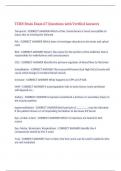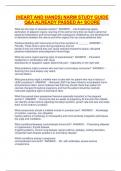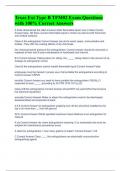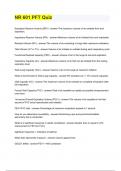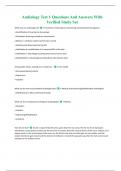COM2603
Assignment 1
Semester 2 2023
(761325) - DUE
21 August 2023
QUESTIONS WITH ANSWERS
[School]
[Course title]
,COM2603 Assignment 1 Semester 2 2023 (761325) - DUE
21 August 2023
SECTION 1
INTERCULTURAL COMMUNICATION
QUESTION 1
Read the scenario below and answer the questions that follow. Managers at
Z&B, a United States (US) multinational coffee shop in Kenya, are trying to
understand the culture of their employees and customers on the African
continent. They have noted that, unlike their US customers, Kenyan
customers show respect to older managers and do not speak rudely to them,
even when they are angry. They have also observed that some Kenyan
customers are very rude and speak English with an American accent,
especially those who live in urban areas. The managers want to understand
African culture, so the company can find the best way to communicate with its
African customers. As an intercultural communication expert, you have been
asked to define culture, so that the managers can have a deeper understanding
of what it entails.
1.1 Describe the following characteristics of culture, by using examples from
the scenario above.
1.1.1 Culture is shared (5)
Culture is a shared set of beliefs, values, norms, and practices that a group of
people have in common. It shapes the way individuals within that group interact
with each other and with outsiders. In the scenario, the cultural characteristic of
being respectful to older managers among Kenyan customers illustrates the shared
value of showing deference and reverence to authority figures. This behavior is not
just an individual trait but a cultural norm observed among Kenyan customers at
the multinational coffee shop. The common understanding of this behavior creates
a sense of cohesion and identity among the Kenyan customers.
1.1.2 Culture is dynamic and heterogeneous (5)
Culture is not static; it evolves over time, adapting to changing circumstances and
interactions with other cultures. It is also heterogeneous, meaning there can be
, significant variations within a culture based on factors like age, geography, and
exposure to other cultures. The scenario provides an example of this when it
mentions that some Kenyan customers in urban areas speak English with an
American accent. This adaptation of the language reflects the influence of
American culture on their communication style, showcasing the dynamic nature of
culture. Additionally, the observation that some Kenyan customers are very rude
while others are respectful demonstrates the heterogeneity within the Kenyan
culture. Different individuals within the same culture may have varying
communication styles, influenced by personal experiences and exposure to
different cultural influences.
QUESTION 2
According to Martin et al. (2013), there are four stages that minority and
majority identities go through, in their identity development.
2.1 Discuss the following phases in minority identity development, and
provide examples from your own experience:
2.1.1 Conformity (5)
In the conformity phase, individuals from minority groups may adopt the values,
norms, and behaviors of the dominant culture to fit in and be accepted. They may
suppress or downplay aspects of their own cultural identity to avoid discrimination
or social exclusion. An example from my own experience is when I moved to a
new country and found it easier to conform to the local customs and traditions to
be accepted by the majority. I tried to adopt the local accent, dress, and social
norms to feel like I belonged.
2.1.2 Resistance and separatism (5)
In this phase, individuals from minority backgrounds begin to reject the dominant
culture's norms and values. They may seek to preserve and promote their own
cultural identity and form separate social circles or communities. An example
could be a group of immigrants who feel marginalized and excluded, so they
establish their own cultural associations or events to celebrate their heritage and
find support from others who share similar experiences.
2.2 Discuss the following stages in majority identity development, and provide
examples from your own experience.
2.2.1 Acceptance (5)
Assignment 1
Semester 2 2023
(761325) - DUE
21 August 2023
QUESTIONS WITH ANSWERS
[School]
[Course title]
,COM2603 Assignment 1 Semester 2 2023 (761325) - DUE
21 August 2023
SECTION 1
INTERCULTURAL COMMUNICATION
QUESTION 1
Read the scenario below and answer the questions that follow. Managers at
Z&B, a United States (US) multinational coffee shop in Kenya, are trying to
understand the culture of their employees and customers on the African
continent. They have noted that, unlike their US customers, Kenyan
customers show respect to older managers and do not speak rudely to them,
even when they are angry. They have also observed that some Kenyan
customers are very rude and speak English with an American accent,
especially those who live in urban areas. The managers want to understand
African culture, so the company can find the best way to communicate with its
African customers. As an intercultural communication expert, you have been
asked to define culture, so that the managers can have a deeper understanding
of what it entails.
1.1 Describe the following characteristics of culture, by using examples from
the scenario above.
1.1.1 Culture is shared (5)
Culture is a shared set of beliefs, values, norms, and practices that a group of
people have in common. It shapes the way individuals within that group interact
with each other and with outsiders. In the scenario, the cultural characteristic of
being respectful to older managers among Kenyan customers illustrates the shared
value of showing deference and reverence to authority figures. This behavior is not
just an individual trait but a cultural norm observed among Kenyan customers at
the multinational coffee shop. The common understanding of this behavior creates
a sense of cohesion and identity among the Kenyan customers.
1.1.2 Culture is dynamic and heterogeneous (5)
Culture is not static; it evolves over time, adapting to changing circumstances and
interactions with other cultures. It is also heterogeneous, meaning there can be
, significant variations within a culture based on factors like age, geography, and
exposure to other cultures. The scenario provides an example of this when it
mentions that some Kenyan customers in urban areas speak English with an
American accent. This adaptation of the language reflects the influence of
American culture on their communication style, showcasing the dynamic nature of
culture. Additionally, the observation that some Kenyan customers are very rude
while others are respectful demonstrates the heterogeneity within the Kenyan
culture. Different individuals within the same culture may have varying
communication styles, influenced by personal experiences and exposure to
different cultural influences.
QUESTION 2
According to Martin et al. (2013), there are four stages that minority and
majority identities go through, in their identity development.
2.1 Discuss the following phases in minority identity development, and
provide examples from your own experience:
2.1.1 Conformity (5)
In the conformity phase, individuals from minority groups may adopt the values,
norms, and behaviors of the dominant culture to fit in and be accepted. They may
suppress or downplay aspects of their own cultural identity to avoid discrimination
or social exclusion. An example from my own experience is when I moved to a
new country and found it easier to conform to the local customs and traditions to
be accepted by the majority. I tried to adopt the local accent, dress, and social
norms to feel like I belonged.
2.1.2 Resistance and separatism (5)
In this phase, individuals from minority backgrounds begin to reject the dominant
culture's norms and values. They may seek to preserve and promote their own
cultural identity and form separate social circles or communities. An example
could be a group of immigrants who feel marginalized and excluded, so they
establish their own cultural associations or events to celebrate their heritage and
find support from others who share similar experiences.
2.2 Discuss the following stages in majority identity development, and provide
examples from your own experience.
2.2.1 Acceptance (5)

